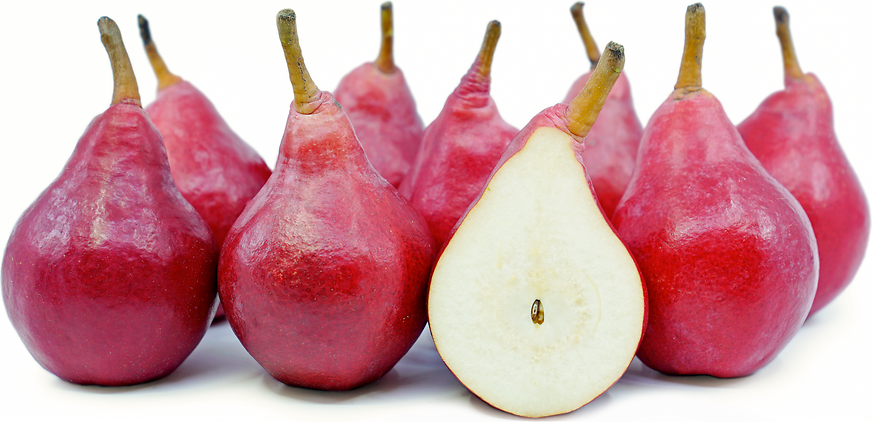


Red Crimson Pears
Estimated Inventory, 20 lbs : 0
Description/Taste
Red Crimson pears are small to medium in size, averaging seven centimeters in diameter and ten centimeters in length, and are tear-drop in shape with a large, bulbous base slightly tapering to a smaller rounded neck. The smooth, thin skin transforms from deep crimson to a bright red when ripe and is covered in prominent lenticels or pores and connects to a signature stocky, thick brown-green stem. The flesh is ivory to cream-colored and is moist, creamy, and fine-grained. Red Crimson pears are aromatic, soft, and very juicy with a mild, sweet-tart flavor with floral undertones.
Seasons/Availability
Red Crimson pears are available at the end of the summer through mid-winter.
Current Facts
Red Crimson pears, botanically classified as Pyrus communis, are a well-known summer variety and are members of the Rosaceae family along with apples and apricots. Red Crimson pears are one of the first varieties to make an appearance at the beginning of pear season and are valued for their bright color and sweet flavor. The crimson fruit is also known as Starkrimson, which was named for the Stark Brothers Nursery that originally propagated and patented the variety. Unlike other varieties, Red Crimson pears are unique as they are deemed ripe by the color of their skin and should not be checked by using the neck test. These pears transform from a deep red to a bright red when ripe and will ripen from the inside out. If judged by the feel of the neck, the fruit will most likely be overripe before the neck shows signs of softness.
Nutritional Value
Red Crimson pears contain calcium, potassium, vitamin C, and dietary fiber.
Applications
Red Crimson pears are best suited for raw applications as their bright red flesh is showcased in dishes when consumed fresh. They can be sliced and mixed into pasta salads, fruit salads, and green salads, served as a topping on pizza, paired with strong cheeses on a charcuterie board, served with pesto and fresh cheese as an appetizer, made into pear kimchi, or blended into smoothies, cereal, and yogurt bowls. They can also be used in some desserts such as popovers, bread, and cakes. Red Crimson pears compliment cheeses such as burrata, goat, gorgonzola, and blue, hazelnut, almonds, mint, cilantro, radicchio, kale, arugula, jicama, carrots, garlic, onions, meats such as pulled pork, beef, and chicken, strawberries, kiwi, apple, lime, avocado, panzanella, quinoa, and cacao. They will keep up to three weeks when stored in the refrigerator and for a couple of days when stored at room temperature.
Ethnic/Cultural Info
The name Red Crimson was changed to Starkrimson in 1956 when Stark Brothers Nursery patented the variety and began cultivation on a wide scale. The name was created from a combination of the color of the fruit and the company’s name. It took many years for the nursery to cultivate the trees to produce substantial amounts of fruit, but as the volume increased, the demand for the bright red pears also rose.
Geography/History
Red Crimson pears were discovered in the 1950s in Missouri as a spontaneous mutation, also known as a sport on a green Clapp's favorite pear tree. The new variety was successfully cultivated and patented in 1956 by Stark Brothers Nursery, and today Red Crimson pears can be found at specialty grocers and farmers markets in the United States in the Pacific Northwest and the cooler, northern climates of the Mid-west. They are also grown in Chile and New Zealand.
Recipe Ideas
Recipes that include Red Crimson Pears. One
| The Plum Palate |
|
Late Summer Salad |
| Bakers Royale |
|
Chocolate Dipped Pears with Almond Crunch |
| Weelicious |
|
Pear Apple Butter |
| Zoellie |
|
Almond Pear Fig Tart |
Podcasts




